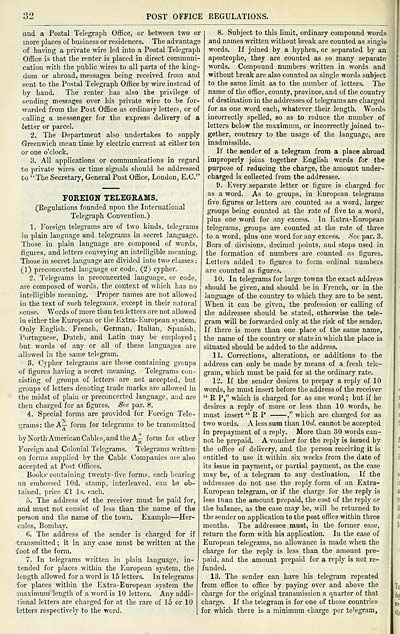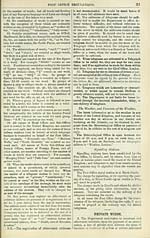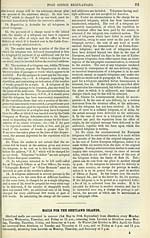Download files
Complete book:
Individual page:
Thumbnail gallery: Grid view | List view

32
POST OFFICE KEGULATIONS.
and a Postal Telegraph OiRce, or between two or
more places of business or residences. The advantage
of having a private wire led into a Postal Telegraph
Office is that the renter is placed in direct communi-
cation with the public wires to all parts of the king-
dom or abroad, messages being received from and
sent to the Postal Telegraph Office by wire instead of
by hand. The renter has also the privilege of
sending messages over bis private wire to be for-
warded from the Post Office as ordinary letters, or of
■calling a messenger for the express delivery of a
letter or parcel.
2. The Department also undertakes to supply
Greenwich mean time by electric current at either ten
or one o'clock.
3. All applications or communications in regard
to private wires or time signals should be addressed
€o "The Secretary, General Post Office, London, E.G."
FOREIGN TELEGRAMS.
(Regulations founded upon the International
Telegraph Convention.)
1. Foreign telegrams are of two kinds, telegrams
in plain language and telegrams in secret language.
Those in plain language are composed of words,
figures, and letters conveying an intelligible meaning.
Those in secret language are divided into two classes :
•(1) preconcerted language or code, (2) cypher.
2. Telegrams in preconcerted language, or code,
are composed of words, the context of which has no
intelligible meaning. Proper names are not allowed
in the text of such telegrams, except in their natural
sense. Words of more than ten letters are not allowed
in either the European or the Extra-European system.
Only English. French, German, Italian, Spanish,
Portuguese, Dutch, and Latin may be employed;
but words of any or all of these languages are
allowed in the same telegram.
3. Cypher telegrams are those containing groups
of figures having a secret meaning. Telegrams con-
sisting of groups of letters are not accepted, but
groups of letters denoting trade marks are allowed in
the midst of plain or preconcerted language, and are
then charged for as figures. See par. 8.
4. Special forms are provided for Foreign Telo-
■grams: the Aj form for telegrams to be transmitted
by North American Cables, and the A;^ fonn for other
Foreign and Colonial Telegrams. Telegrams written
on forms supplied by the Cable Companies are also
accepted at Post Offices.
Books- containing twenty-five forms, each bearing
an embossed lOd. stamp, interleaved, can be ob-
tained, price £1 Is. each.
5. The address of the receiver must be paid for,
and must not consist of less than the name of the
person and the name of the town. Example — Her-
cules, Bombay.
6. The address of the sender is charged for if
itransmitted ; it in any case must be written at the
foot of the form.
7. In telegrams written in plain language, in-
tended for places within the European system, the
length allowed for a word is 16 letters. In telegrams
for places within the Extra-European system the
anaximum length of a word is 10 letters. Any addi-
tional letters are charged for at the rare of 15 or 10
letters respectively to the word.
8. Subject to this limit, ordinary compound words
and names written without break are counted as single
words. If joined by a hyphen, or separated by an
apostrophe, they are counted as so many separate
words. Compound numbers written in words and
without break are also counted as single words subject
to the same limit as to the number of letters. The
name of the office, county, province, and of the country
of destination in the addresses of telegrams are charged
for as one word each, whatever their length. Words
incon-ectly spelled, so as to reduce the number of
letters below the maximum, or incorrectly joined to-
gether, contrary to the usage of the language, are
inadmissible.
If the sender of a telegram from a place abroad
improperly joins together English words for the
purpose of reducing the charge, the amount under-
charged is collected from the addressee.
9. Every separate letter or figure is charged for
as a word. As to groups, in European telegrams
five figures or letters are counted as a word, larger
groups being counted at the rate of five to a word,
plus one word for any excess. In Extra-European
telegrams, groups are counted at the rate of three
to a word, plus one word for any excess. See par. 3.
Bars of divisions, decimal points, and stops used in
the formation of numbers are counted as figures.
Letters added to figures to form ordinal numbers
are counted as figures.
10. In telegrams for large towns the exact address
should be given, and should be in French, or in the
language of the country to which they are to be sent.
When it can he given, the profession or calling of
the addressee should be stated, otherwise the tele-
gram will be forwarded only at the risk of the sender.
If there is more than one place of the same name,
the name of the country or state in which the place is
situated should be added to the address.
11. Corrections, alterations, or additions to the
address can only be made by means of a fresh tele-
gram, which must be paid for at the ordinary rate.
12. If the sender desires to prepay a reply of 10
words, he must insert before the address of the receiver
" R P," which is charged for as one word ; but if he
desu-es a reply of more or less than 10 words, he
must insert " R P ," which are charged for as
two words. A less sum than lOd cannot he accepted
in prepayment of a reply. More than 30 words can-
not be prepaid. A voucher for the reply is issued by
the office of delivery, and the persoQ receiving it is
entitled to use it within six weeks from the date of
its issue in payment, or partial payment, as the case
may be, of a telegram to any destination. If the
addressee do not use the reply form of an Extra-
European telegram, or if the charge for the reply is
less than the amount prepaid, the cost of the reply or
the balance, as the case may he, will be returned to
the sender on application to the post office within three
months. The addressee must, in the former ease,
return the form with his application. In the case of
European telegrams, no allowance is made when the
charge for the reply is less than the amount pre-
paid, and the amount prepaid for a reply is not re-
funded.
13. The sender can have his telegram repeated
from office to office by paying over and above the
charge for the original transmission a quarter of that
charge. If the telegram is for one of those countries
for which there is a minimum charge per te'egram,
POST OFFICE KEGULATIONS.
and a Postal Telegraph OiRce, or between two or
more places of business or residences. The advantage
of having a private wire led into a Postal Telegraph
Office is that the renter is placed in direct communi-
cation with the public wires to all parts of the king-
dom or abroad, messages being received from and
sent to the Postal Telegraph Office by wire instead of
by hand. The renter has also the privilege of
sending messages over bis private wire to be for-
warded from the Post Office as ordinary letters, or of
■calling a messenger for the express delivery of a
letter or parcel.
2. The Department also undertakes to supply
Greenwich mean time by electric current at either ten
or one o'clock.
3. All applications or communications in regard
to private wires or time signals should be addressed
€o "The Secretary, General Post Office, London, E.G."
FOREIGN TELEGRAMS.
(Regulations founded upon the International
Telegraph Convention.)
1. Foreign telegrams are of two kinds, telegrams
in plain language and telegrams in secret language.
Those in plain language are composed of words,
figures, and letters conveying an intelligible meaning.
Those in secret language are divided into two classes :
•(1) preconcerted language or code, (2) cypher.
2. Telegrams in preconcerted language, or code,
are composed of words, the context of which has no
intelligible meaning. Proper names are not allowed
in the text of such telegrams, except in their natural
sense. Words of more than ten letters are not allowed
in either the European or the Extra-European system.
Only English. French, German, Italian, Spanish,
Portuguese, Dutch, and Latin may be employed;
but words of any or all of these languages are
allowed in the same telegram.
3. Cypher telegrams are those containing groups
of figures having a secret meaning. Telegrams con-
sisting of groups of letters are not accepted, but
groups of letters denoting trade marks are allowed in
the midst of plain or preconcerted language, and are
then charged for as figures. See par. 8.
4. Special forms are provided for Foreign Telo-
■grams: the Aj form for telegrams to be transmitted
by North American Cables, and the A;^ fonn for other
Foreign and Colonial Telegrams. Telegrams written
on forms supplied by the Cable Companies are also
accepted at Post Offices.
Books- containing twenty-five forms, each bearing
an embossed lOd. stamp, interleaved, can be ob-
tained, price £1 Is. each.
5. The address of the receiver must be paid for,
and must not consist of less than the name of the
person and the name of the town. Example — Her-
cules, Bombay.
6. The address of the sender is charged for if
itransmitted ; it in any case must be written at the
foot of the form.
7. In telegrams written in plain language, in-
tended for places within the European system, the
length allowed for a word is 16 letters. In telegrams
for places within the Extra-European system the
anaximum length of a word is 10 letters. Any addi-
tional letters are charged for at the rare of 15 or 10
letters respectively to the word.
8. Subject to this limit, ordinary compound words
and names written without break are counted as single
words. If joined by a hyphen, or separated by an
apostrophe, they are counted as so many separate
words. Compound numbers written in words and
without break are also counted as single words subject
to the same limit as to the number of letters. The
name of the office, county, province, and of the country
of destination in the addresses of telegrams are charged
for as one word each, whatever their length. Words
incon-ectly spelled, so as to reduce the number of
letters below the maximum, or incorrectly joined to-
gether, contrary to the usage of the language, are
inadmissible.
If the sender of a telegram from a place abroad
improperly joins together English words for the
purpose of reducing the charge, the amount under-
charged is collected from the addressee.
9. Every separate letter or figure is charged for
as a word. As to groups, in European telegrams
five figures or letters are counted as a word, larger
groups being counted at the rate of five to a word,
plus one word for any excess. In Extra-European
telegrams, groups are counted at the rate of three
to a word, plus one word for any excess. See par. 3.
Bars of divisions, decimal points, and stops used in
the formation of numbers are counted as figures.
Letters added to figures to form ordinal numbers
are counted as figures.
10. In telegrams for large towns the exact address
should be given, and should be in French, or in the
language of the country to which they are to be sent.
When it can he given, the profession or calling of
the addressee should be stated, otherwise the tele-
gram will be forwarded only at the risk of the sender.
If there is more than one place of the same name,
the name of the country or state in which the place is
situated should be added to the address.
11. Corrections, alterations, or additions to the
address can only be made by means of a fresh tele-
gram, which must be paid for at the ordinary rate.
12. If the sender desires to prepay a reply of 10
words, he must insert before the address of the receiver
" R P," which is charged for as one word ; but if he
desu-es a reply of more or less than 10 words, he
must insert " R P ," which are charged for as
two words. A less sum than lOd cannot he accepted
in prepayment of a reply. More than 30 words can-
not be prepaid. A voucher for the reply is issued by
the office of delivery, and the persoQ receiving it is
entitled to use it within six weeks from the date of
its issue in payment, or partial payment, as the case
may be, of a telegram to any destination. If the
addressee do not use the reply form of an Extra-
European telegram, or if the charge for the reply is
less than the amount prepaid, the cost of the reply or
the balance, as the case may he, will be returned to
the sender on application to the post office within three
months. The addressee must, in the former ease,
return the form with his application. In the case of
European telegrams, no allowance is made when the
charge for the reply is less than the amount pre-
paid, and the amount prepaid for a reply is not re-
funded.
13. The sender can have his telegram repeated
from office to office by paying over and above the
charge for the original transmission a quarter of that
charge. If the telegram is for one of those countries
for which there is a minimum charge per te'egram,
Set display mode to: Large image | Transcription
Images and transcriptions on this page, including medium image downloads, may be used under the Creative Commons Attribution 4.0 International Licence unless otherwise stated. ![]()
| Scottish Post Office Directories > Towns > Glasgow > Post-Office annual Glasgow directory > 1893-1894 > (1398) |
|---|
| Permanent URL | https://digital.nls.uk/85383368 |
|---|
| Description | Directories of individual Scottish towns and their suburbs. |
|---|
| Description | Around 700 Scottish directories published annually by the Post Office or private publishers between 1773 and 1911. Most of Scotland covered, with a focus on Edinburgh, Glasgow, Dundee and Aberdeen. Most volumes include a general directory (A-Z by surname), street directory (A-Z by street) and trade directory (A-Z by trade). |
|---|


